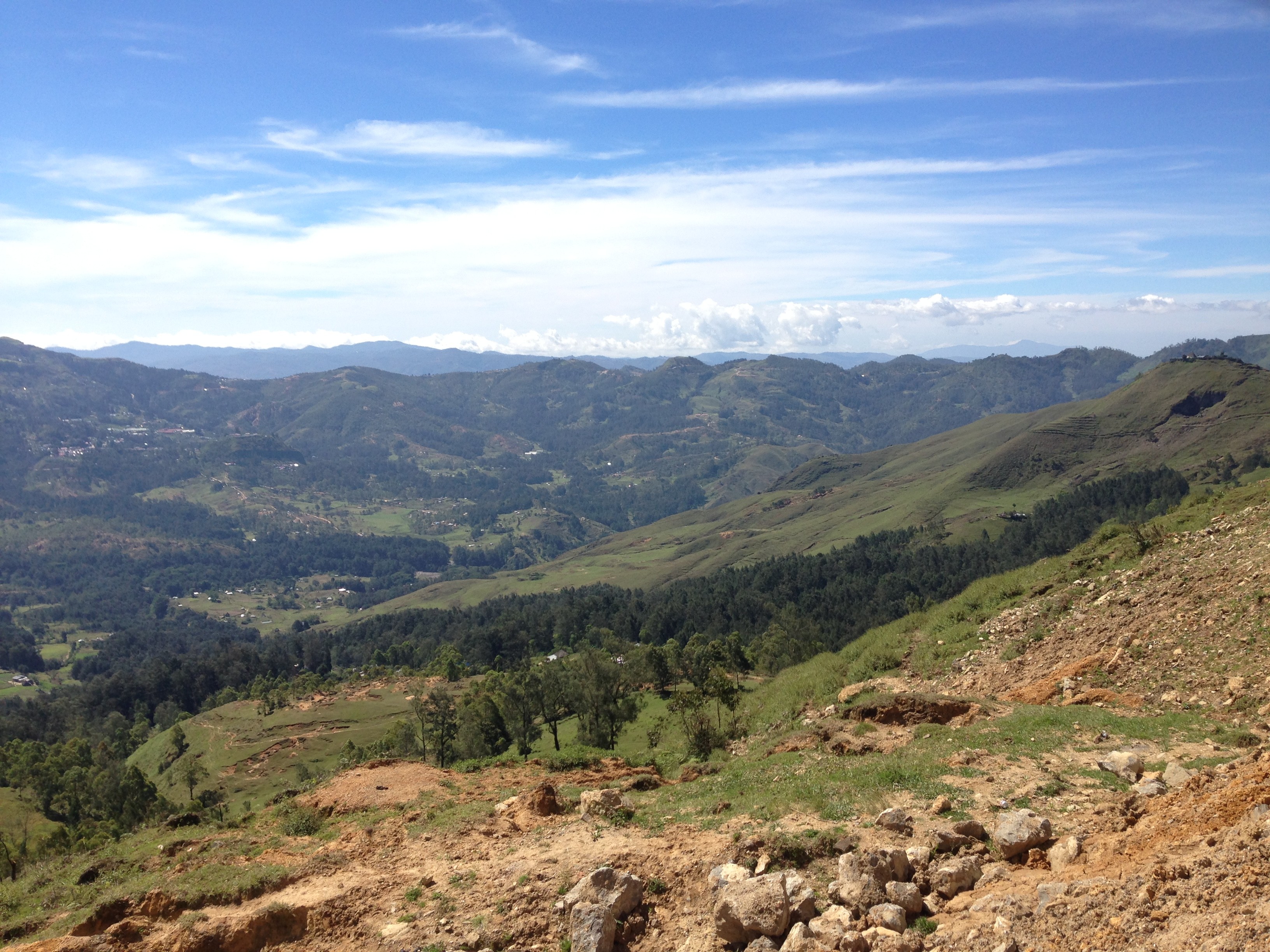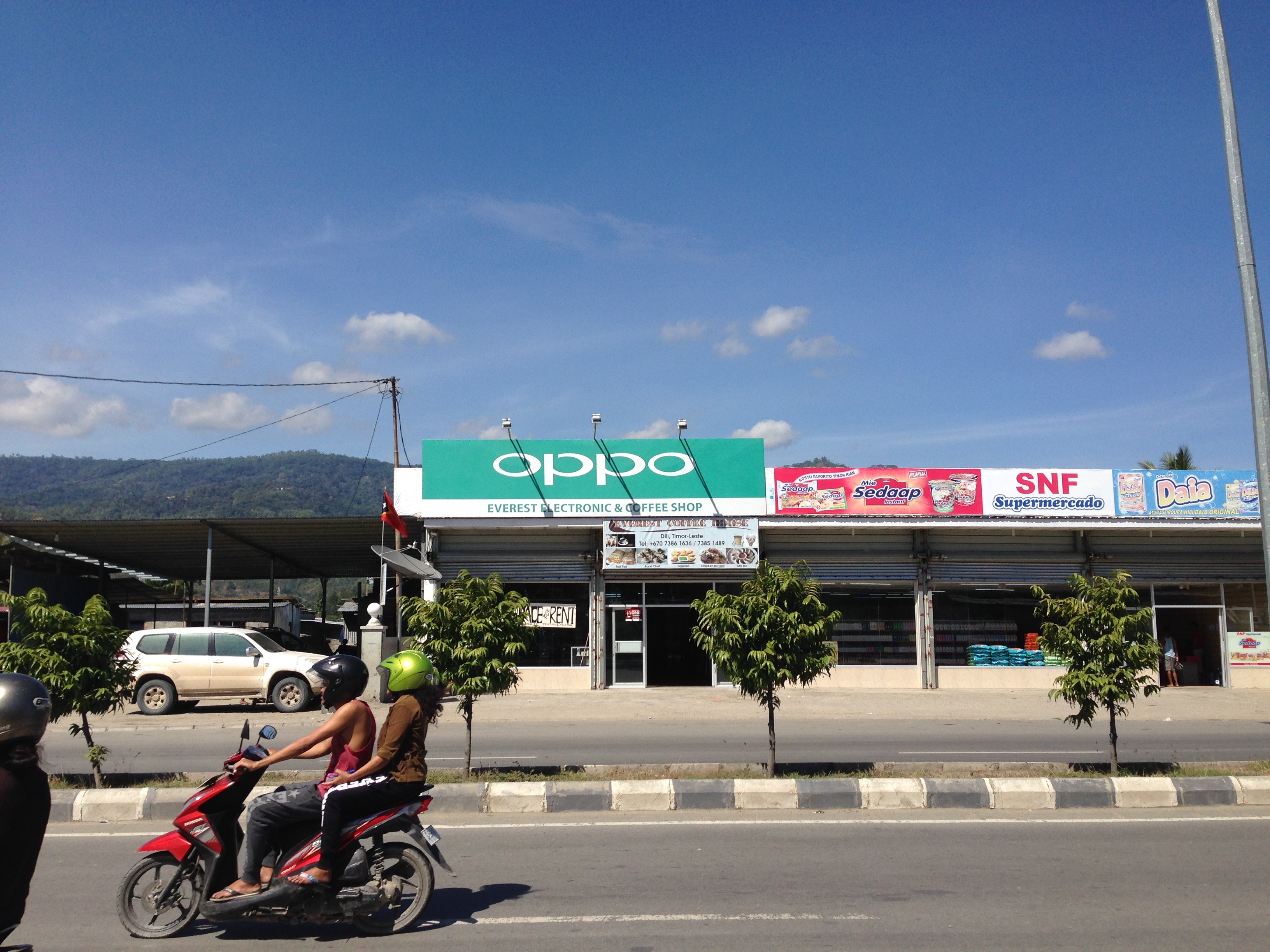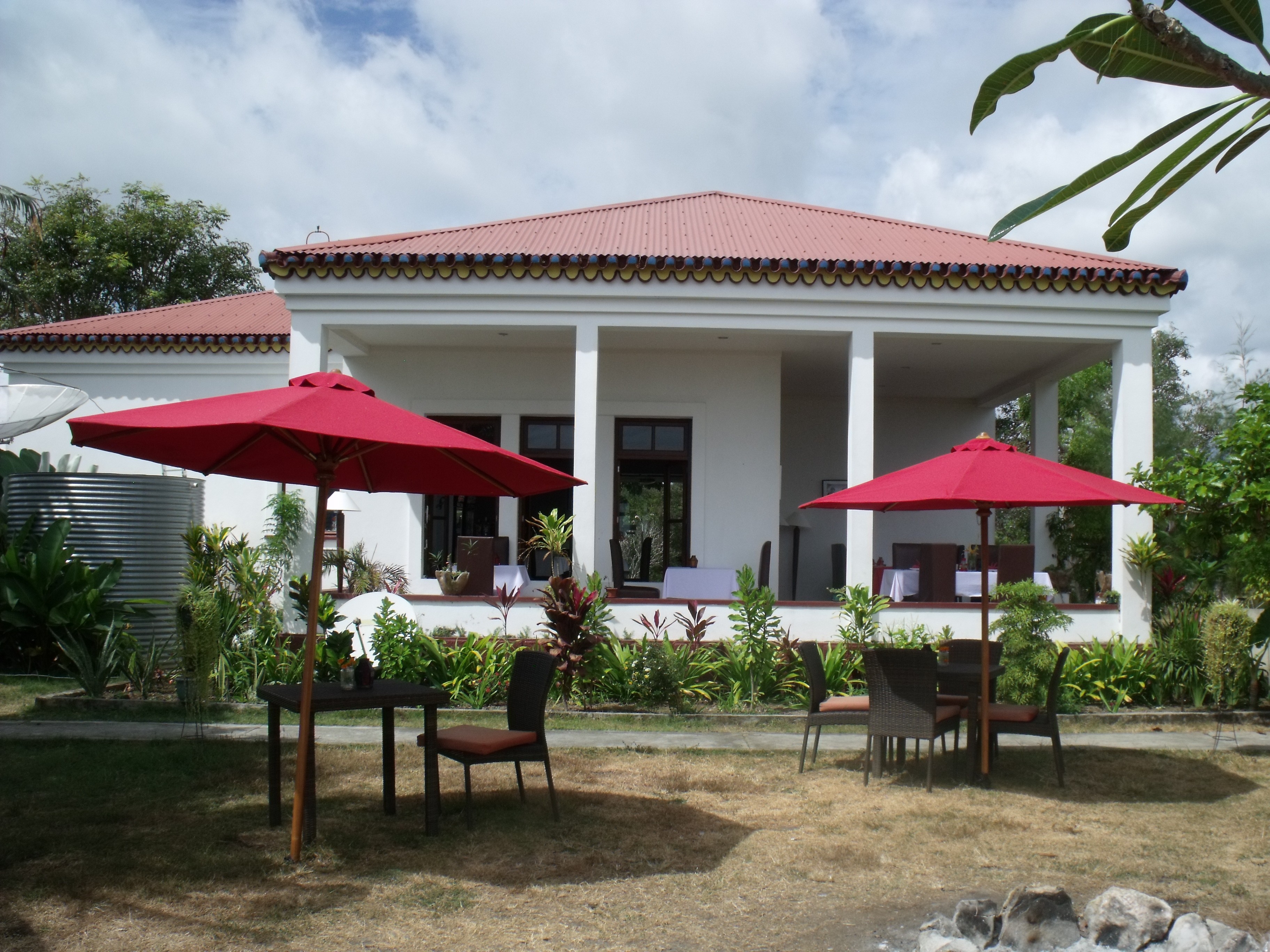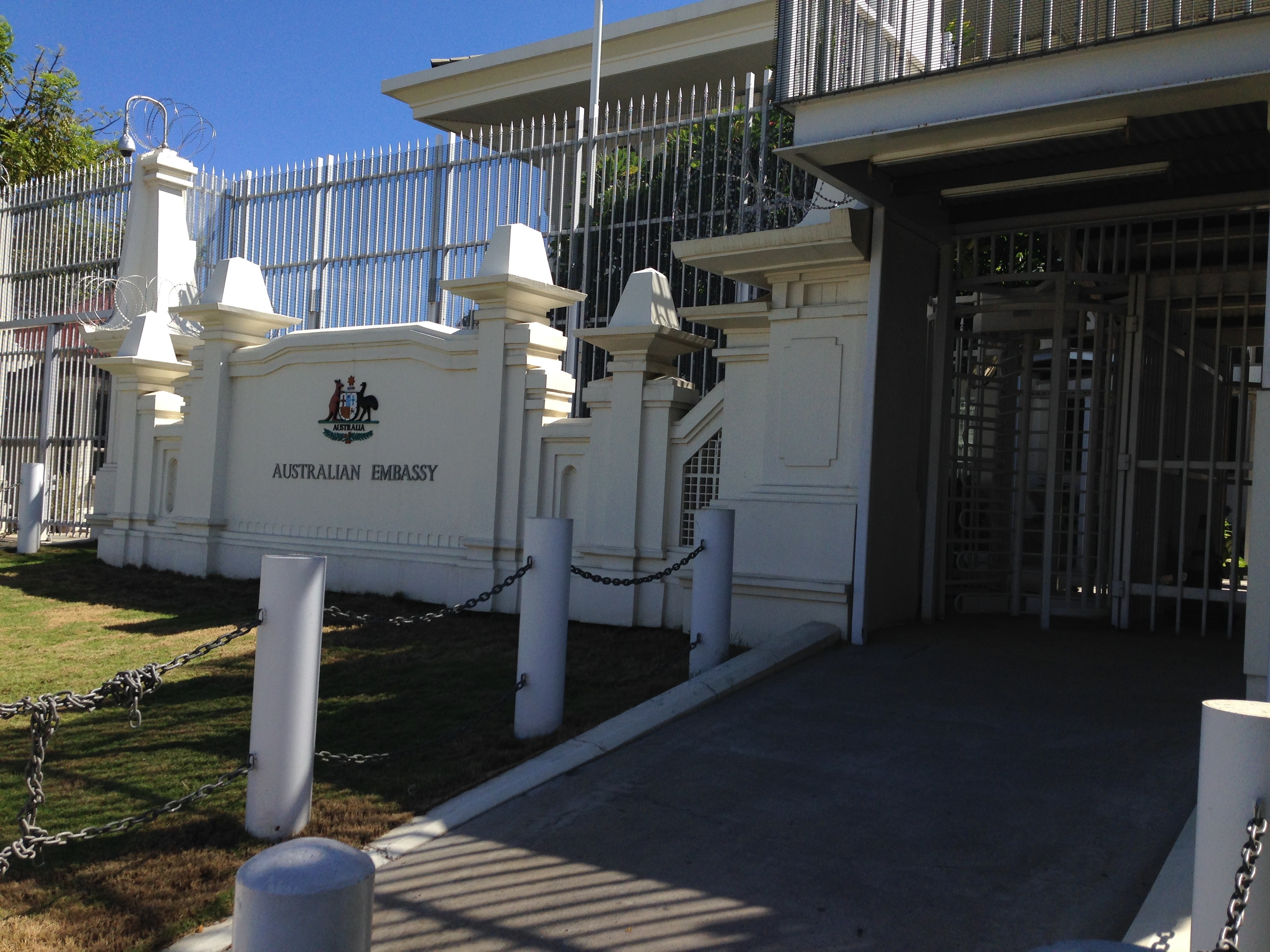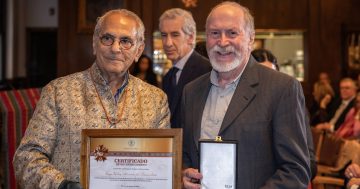I wake before 6am to the sounds of the Sisters and the congregation singing during early morning prayers. The beauty of their voices and harmonies is mesmerising, an absolute joy to experience…
The day dawns overcast, hot & sticky. The temperature hovers around 34 degrees during the day dipping to just 24 overnight. So I have no complaint about the cold shower on offer, it provides much-needed relief.
Breakfast is just after seven (corn flakes, egg, bread rolls, sliced cheese, jam and those delicious sweet little local bananas) and as we gather with the Sisters and the young acolytes something special is brewing.
One of the Sisters has a guitar and they launch into a joyful song. It is the birthday of one of the young trainees and she is moved to tears by the singing, a gift of flowers and a small present. The realisation that this young woman has grown up in poverty, that this little birthday celebration is one that she has probably never experienced before, is very moving. As she stands we all file by to greet and hug her, the tears are rolling down my cheeks.
Tonight Dave has arranged for us to meet up with Ego Lemos, permaculturist, singer, songwriter of renown in Timor Leste. If you’ve seen the 2009 film Balibo you’ve heard his haunting song of the same name, or perhaps you were in the audience in the Candelo Town Hall in 2012 when Ego performed there.
This morning though, Balibo itself beckons.
There are four of us in the Toyota for the journey – Jose, Dave, Augus, and me.
The 130 kilometres is about a four-hour drive from Dili mostly along the coast towards the border with Indonesian West Timor.
We take to the chaotic early morning Dili traffic fueling up at one of the local service stations. Diesel is around 79 cents a litre. That I think equates to about $1 Aus. There’s a steady stream of motor scooters lined up at the petrol bowsers, out on the roads it often seems there are more motor scooters than people in Dili.
What is so striking here in Dili and across Timor is the youth. Everywhere you see the vibrancy of young people, children, young families. Imagine a country where 42% of the population is under 15 years, 62% under 25, more than 90% under 55! You ask, why so young? Where are the older people?
You ask, why so young? Where are the older people?
Well there’s the life expectancy of 65 years for men, 69 for women. Then there’s the Indonesian occupation from 1975-1999, during which time the lives of up to a quarter or more of the population were lost.
Timor Leste is one humongous lump of rock, and there is no shortage of the stuff. Rocks are used in just about every construction, for house footings, roadside drainage, and retaining walls, even the pots that Jose makes.
On this the northern coast of the island the steep hills rise rapidly to the mountainous interior. Those steep hillsides are much denuded and eroded, the soils seemingly very poor. No doubt firewood collection for cooking has decimated much of that vegetation. Along the roadsides are bundles of crisscrosses dried sticks of firewood waiting for collection and sale in Dili or other towns.
We pass several salt farms along the coast, small household farms that produce salt using traditional methods. A series of ponds allows the seawater to evaporate, the salt brine is collected and dried using firewood and boilers. The salt is then bagged and sold by the roadside.
We stop at a roadside stall at Tibar for water, then Loes for coffee. Rich black coffee from one of the roadside kiosks.
Next stop is Balibo.
Just out of Loes, Jose stops to pick up one of the students he has been encouraging, so now we are five.
It’s early afternoon when we arrive at Balibo, just ten kilometres from the border with Indonesian West Timor, we pull up on the road leading up to the Fort.
I have mixed emotions as we walk up the driveway towards the entrance. The Fort is some four hundred years old, and it is the site the Balibo Five were filming from when the Indonesian forces landed in Balibo.
The Fort and surrounds have been transformed into a restaurant and tourist destination with accommodation.
We order lunch – pumpkin soup at five dollars U.S a bowl for Dave and myself, Nasi Goreng for Jose, Augus and Nicolaij at ten U.S dollars per serve. Jose is not impressed. And with good reason. These are not prices the average Timorese can afford. Wages here typically three to five dollars a day. Certainly there are higher wages for government and corporate workers but that is not the norm.
Jose sees the Fort as part of Timor Leste’s history, a place for all Timorese and not a place exclusively for tourists and wealthy locals.
From the Fort, we wander down the hill to Balibo House and Museum where we meet Michele Rankin.
I’m humbled by the commitment of people like Michele and those from the Balibo House Trust. They are truly inspiring people. Michele has her two daughters visiting from Brisbane during the school holidays.
Balibo House was the last refuge of the five Australian-based journalists, Greg Shackleton, Gary Cunningham, Tony Stewart, Malcolm Rennie and Brian Peters who were murdered by Indonesian troops in 1975. Fellow newsman Roger East was murdered seven weeks later as he investigated the deaths of his five colleagues.
Balibo House Trust was established by the Victorian Government in October 2002, it has since been handed back to to the people of the Balibo district for use as a community learning centre.
As we prepare to leave Balibo there is one site I don’t have the stomach to visit.
Amongst the Timorese it is known as the ‘Kissing House’.
Heather from the Balibo House Trust explains to us that it was the place where the bodies of the Balibo Five were dragged to and burnt after they were shot.
Heather says she has heard two explanations about the origins of the name ‘Kissing House’ – both equally brutal and point to the depraved actions of the Indonesian forces over many years.
The souls who have been murdered here still move in this space and perhaps guide the good work that now takes place in their memory.
The mission of the Balibo House Trust includes:
- Promoting early childhood education through the Balibo Five Kindergarten.
- Developing skills through the Balibo Community Learning Centre.
- Creating employment and income through tourism at the historic Balibo Fort and Balibo Fort Hotel.
- Fostering awareness of the relationships between Australia, Timor-Leste, and Indonesia.
- Maintaining a permanent memorial to the five journalists murdered at Balibo in 1975 and to the Balibo people murdered during the Indonesian occupation of Timor-Leste.
From Balibo back to the border town of Batugade is about a 40-minute drive and we decide to take a closer look at the border crossing into Indonesian controlled West Timor.
The border crossing at Batugade is busy with trucks, buses, SUV’s, motorbikes and even the TNI – Indonesian Special Forces, who are taking advantage of the shops selling drinks and food on the Timor side.
After a short break at the border, it’s time for the long drive back to Dili for our much-anticipated meeting with Ego Lemos.
Apart from a few sections, the roads back to Dili are pretty good.
The late afternoon is hot and despite this being the dry season, storm clouds have been building. As we near Liquica the storm breaks, a fierce torrential downpour makes the winding sections of road more treacherous.
Back in Dili, Dave and I have time for a quick change of clothes and another application of DEET. The Mosquitos here carry malaria and dengue fever, so the daily ritual of the DEET spray is an essential precaution.
For us, long shirts, pants, and footwear, particularly in the evening guarantees the nasties have little-exposed flesh to attack. But they’re sneaky little buggers. Back home in Bega, I’m used to a tiger moth buzzing sound as a warning, but not here, these critters attack in silence. Thankfully the spray seems to work.
It is now after 7.30pm but it’s a fairly short drive to Ego’s home in the Comoro district of Dili, where we have been invited to share a meal with his family.
What an evening it is – food, wine, conversation, and song. The evening meal of traditional dishes is delicious. A soup of local corn and meat, rice, steamed greens and spicy dried small fish as an entree. And don’t forget the chili!
The evening meal of traditional dishes is delicious. A soup of local corn and meat, rice, steamed greens and spicy dried small fish as an entree. And don’t forget the chili!
With food, wine, and song, the conversation turns to the possibility of pulling together a Timorese choir to come to the Bega Valley and beyond in 2020.
Bringing a choir from Timor Leste to Australia is not new for Ego Lemos.
2012 saw the debut of Koro Loriko, a Timor-Leste choir formed by Ego Lemos and Victorian based arts advocate group – The Boite.
Singers from all over Timor-Leste worked with the Melbourne Millennium Chorus, a ten week rehearsal period culminated with a grand performance, in the Melbourne Town Hall.
Ego also tells us about a school permaculture camp he’s leading in Maubisse towards the end of next year.
It is to be five days of workshops for around two thousand local students. The conversation suggests that perhaps there could be a choir workshop as well, with the choir that’s formed coming together with community singers from Melbourne and the Bega Valley for a tour of Australia. Perhaps in 2020!
Dave and Ego also get talking about Ego’s appearance at the Cobargo Folk Festival next year.
Ego Lemos is an inspirational singer, song writer, and performer, perhaps best described as the Paul Kelly of Timor Leste. He talks of plans to spend two months in Australia around the time of the 2018 Cobargo Folk Festival – exciting plans indeed.
It’s getting late, Jose takes a call from the Sisters at Fatuhada who are wondering when he will return us to the convent!
Time though for a few more songs with Egos’ 72-year-old mum on the harmonica, and some conversation about permaculture.
A dedicated permaculturist, Ego founded the country’s first permaculture centre, Permatil.
He also founded a highly successful sustainable agriculture network, HASATIL, both of which still flourish today.
At the beginning of this year, Permatil signed a Memorandum of Understanding with the Government to take over the schools garden program.
Inspired by Australian’s Bill Mollison and David Holmgren, permaculture is now part of the school curriculum and a compulsory subject in all schools nationwide! A remarkable achievement and another bond to Australia.
With plans for next year and the formation of a choir still bubbling, it’s time to head for home.
For now, it’s back to Fatuhada, my head swimming with Timorese songs and the friendships formed with these wonderful people.
Words and photos by Tim Holt
Catch up on Postcard 1 and Postcard 2, thanks to About Regional Members – Kelly Murray, Shane O’Leary, Olwen Morris, and Oh’Allmhurain Films for supporting local story telling.
About Regional Memberships are open now to individuals and families, community groups, and businesses.


